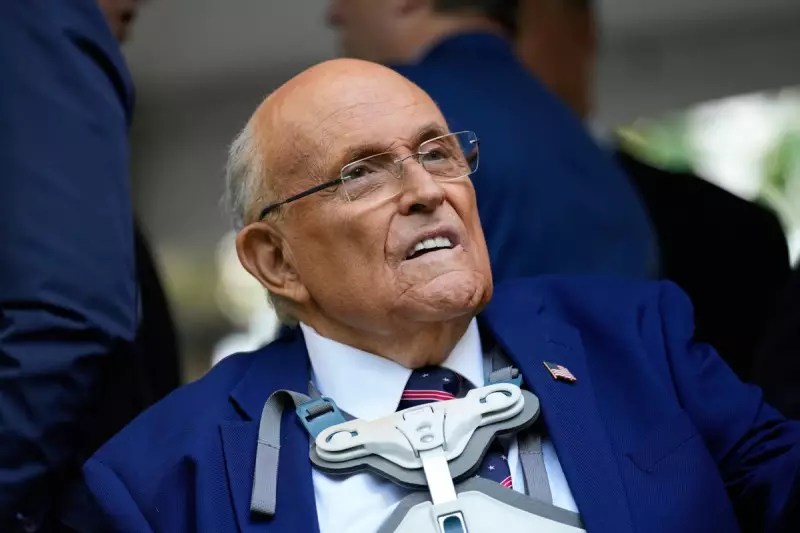
Former President Donald Trump's decision to grant presidential pardons to disgraced former New York City Mayor Rudy Giuliani and 76 other individuals involved in the unsuccessful attempt to overturn his 2020 election defeat contains a hidden strategic message that could significantly impact ongoing legal battles.
The Strategic Pardon Gambit
According to exclusive sources speaking with The Independent, Trump's late-Sunday-night pardons extend far beyond simply protecting his loyalists from federal prosecution. The move represents a calculated effort to covertly pressure state courts where the president lacks any authority to issue pardons into dismissing charges against those still facing local prosecutions.
The blanket reprieve absolves Giuliani—once celebrated as "America's Mayor" following the 9/11 attacks before transforming into Trump's personal attorney—alongside former Trump lawyers Sidney Powell, Kenneth Chesebro, and Jenna Ellis. Current Trump attorney Boris Epshteyn and Republican activists who signed forged electoral college certificates also received pardons for any federal criminal liability relating to the fake elector scheme.
This elaborate plot indirectly contributed to the violent mob of Trump supporters storming the US Capitol on January 6th, aiming to prevent certification of Joe Biden's election victory.
State-Level Legal Battles Continue
Despite the sweeping federal pardons, none of the recipients actually faced federal charges stemming from the failed election overturn attempt. With Trump back in power and the five-year statute of limitations for potential crimes set to expire in under ten weeks, none would have faced federal prosecution regardless.
The Independent has learned that the announcement from Department of Justice pardon attorney Ed Martin—himself a prominent figure in the "stop the steal" movement—forms part of a long-shot strategy to influence state-level charges brought against fake electors and Trump confidantes in Arizona, Georgia, Michigan, Nevada, and Wisconsin.
A Justice Department official, speaking anonymously, revealed that these pardons had been "circulating for months" between the White House, the DOJ, conservative scholars, and other interested parties—including Trump personally—despite the president's inability to prevent state-level prosecutions.
"The President of the United States was actively involved in advancing this. And everyone understood that it wasn't going to have that effect," the official stated.
Ongoing Prosecutions Across Multiple States
While Trump himself only faced state-level charges in Georgia for election interference attempts—with that case currently paused after Fulton County District Attorney Fani Willis was disqualified for ethical violations last year—his allies and co-defendants in various cases could still confront serious consequences for their actions nearly five years ago.
In Wisconsin, Kenneth Chesebro, Trump campaign operative Michael Roman, and attorney Jim Troupis face numerous felony charges for their alleged involvement in the forged electoral certificate scheme. Arizona Attorney General Kris Mayes is prosecuting eighteen Trump allies, with indictments naming Trump as an unindicted co-conspirator and alleged mastermind of a plot to steal the state's electoral votes.
Those facing charges in Arizona include Giuliani, Trump's former chief of staff Mark Meadows, his current personal attorney Boris Epshteyn, and former Arizona GOP chair Kelli Ward. Similar to the Georgia case, this prosecution remains on hold pending appeal after the presiding judge recused himself and a replacement ruled the case flawed because the grand jury hadn't been shown the 1887 Electoral Count Act.
Additional cases against fake electors continue in Michigan and Nevada, though proceedings have progressed slowly and encountered multiple legal challenges.
Trump cannot directly halt state court proceedings, but the DOJ source indicated that Trump and his advocates hope state courts will view the federal pardons as persuasive authority arguing for case dismissal.
"The pardon has no effect on state charges, but functions as a very powerful amicus brief to say that to the extent that this is a case about a federal election, the federal government has said there is no case here, and we are completely absolving them," they explained.
The Sunday announcement also noted that pardons extended to Trump administration and campaign members identified in January 6th investigations as facilitating communications between MAGA supporters and conservative activists and sympathetic state lawmakers who backed the president's efforts, including Meadows.
A pointed line near the statement's conclusion explicitly indicated that one individual received no pardon connection to the scheme: Donald J. Trump himself.
Beyond orchestrating the fake elector scheme, members of Trump's 2020 legal team named in the document participated in more conventional election challenge methods. Multiple lawsuits led by Giuliani, Jenna Ellis, and other campaign legal team members argued that widespread voter fraud had altered election results in Biden's favour across numerous states.
The campaign never provided definitive proof to any presiding judge, instead relying on signed affidavits from Trump supporters alleging they witnessed suspicious activity. Campaign sources failed to demonstrate manipulated vote totals in targeted states or identify substantial numbers of voters who participated unlawfully.
Separately, they couldn't prove that Dominion Voting Systems and Smartmatic—companies providing digital election infrastructure during the 2020 election—used manipulated or corrupted systems. Both companies launched massive legal actions against conservative news networks that uncritically broadcast Trump campaign claims, with Fox News settling with Dominion Voting Systems for a staggering $787 million.
Giuliani, as the public face of Trump's 2020 legal team, experienced profound personal and professional disgrace following these events. His frequently sloppy, confused, and inept courtroom performances ultimately led to his disbarment in both Washington, D.C. and New York.





